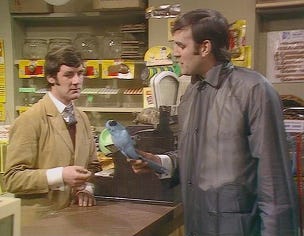For the WSJ, Nick Timiraos writes,
The central bank’s operating losses have increased in recent weeks because the interest it is paying banks and money-market funds to keep money at the Fed now exceeds the income it earns on some $8.3 trillion in Treasury and mortgage-backed securities it accumulated during bond-buying stimulus programs over the past 14 years.
…If the Fed runs sustained losses, it won’t have to turn to Congress, hat in hand. Instead, it will simply create an IOU on its balance sheet called a deferred asset. When the Fed runs a surplus again in future years, it would first pay off the IOU before sending surpluses to the Treasury.
Since 2008, the Fed has accumulated a lot of long-term Treasury bonds and mortgage-backed securities, which it funds with short-term debt, called “interest on reserves” and “reverse repo facility.” Recently, interest rates have risen, and this means that on a mark-to-market basis, the Fed is finished. It is an ex-Fed. It is deceased. It has gone to meet its maker.
But think about it another way. Think of the U.S. Treasury, Freddie Mac, Fannie Mae, and the Fed as a single entity. The Treasury, Freddie, and Fannie issued long-term liabilities. The Fed swapped those for short-term liabilities. The consolidated entity wound up mostly borrowing short term.
The consolidated entity will have to face up to higher interest costs, because the government runs a deficit, and it has been mostly financed short term. The “IOU” to which the WSJ story refers is an accounting device that allocates some of those higher interest costs to the Treasury. The “IOU” is to the Treasury, so if and when the Fed becomes profitable again, the Treasury will receive those profits, first as “IOU” and then as “profits.” Meanwhile, the Treasury backs up the Fed (nails it to its perch, so to speak), and the consolidated entity takes the hit on its interest costs.
Higher interest costs are a problem for the consolidated entity, because they increase the size of the government Budget deficit. The government has to go to the financial markets and ask for more loans. The government can keep borrowing more and more money. . .until it can’t.
The consolidated entity never needed the Fed in order to get into this predicament. If the consolidated entity thought it was a good idea to fund government deficits and mortgages with short-term borrowing, it could have had the Treasury, Freddie, and Fannie issue short-term debt. Instead, they issued long-term debt and sold it to Wall Street investment banks, which in turn sold it at a profit to the Fed, which funded it with short-term debt. It was all a pointless shuffling around within the consolidated entity, ultimately helping neither taxpayers nor the economy as a whole. But Ben Bernanke was just awarded a Nobel Prize, so there’s that.




I wouldn’t say it was pointless. It gave them time to change their ways in an orderly, non catastrophic way. They’ve just wasted that time.😂
Pinin' for the Potomac